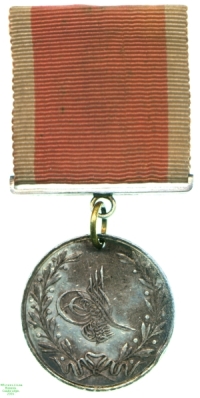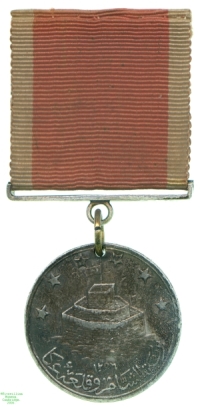
Obverse, the royal cipher of Sultan Abdul Mejid Khan II of the Ottoman Empire, "The slave of the good", with laurel sprays either side

Reverse, a fort flying the Turkish standard with six stars above

Obverse, the royal cipher of Sultan Abdul Mejid Khan II of the Ottoman Empire, "The slave of the good", with laurel sprays either side |

Reverse, a fort flying the Turkish standard with six stars above |
In 1832 the city of Acre, in modern-day Palestine, was seized from Ottoman rule by the Egyptian general Ibrahim Pasha. Ibrahim had been leader of the Ottoman forces fighting Greek rebels in the Greek War of Independence which resulted in the Battle of Navarino, but by 1831 Ottoman distrust of his father, the Vizier Muhammad Ali, and his politics had led to Egypt being in open rebellion against the Turkish sultanate. As part of this Ibrahim was sent to invade Syria, and in 1832 he took the city by siege and went on to defeat two Ottoman armies. He held Syria for six years before the Turkish Porte could face him again, and their immediate defeat led to intervention on the part of the Austrian Empire and Great Britain. On 4 November 1840 their combined Mediterranean squadrons, with assistance from the French, bombarded and retook Acre for the Ottoman Sultan Abdul Mejid I.
On 4 November 1840 a combined British, French and Austrian squadron bombarded and retook the city for the Ottoman Empire. Some of the British forces involved in this campaign were awarded this medal by the Ottoman Sultan Abdul Mejid in 1843; in 1848 many also received the Naval General Service Medal with the appropriate bar.
This medal bears no name, and it is not known to whom it was awarded or in what capacity he served in the campaign. The fact that it is the silver issue rather than bronze means that the recipient was a Quarter-Deck or Warrant Officer. He may also have been eligible for the NGSM, but the example of this medal in the Watson Collection appears to have gone to a seaman more junior than would have received this piece.
Lester Watson purchased this medal at some point before 1928.